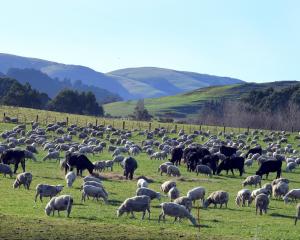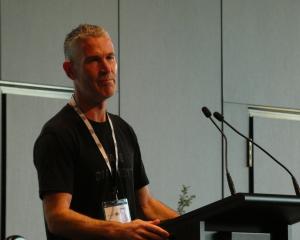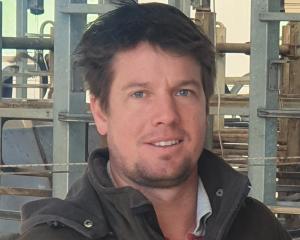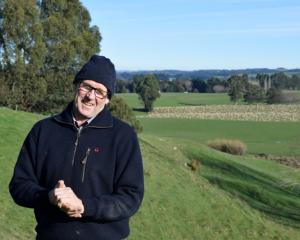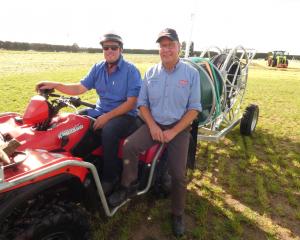
Addressing the co-operative’s annual meeting in Gore yesterday, David Pinckney said he and James Anderson were very strong believers of 100% farmer ownership.
Chairman Mark Wynne, who had earlier spoken about the need to raise capital, said there were three structure options for Alliance’s future — remain 100% farmer-owned, become ‘‘some kind of a joint venture’’, or shareholders could decide to divest 100% and sell the business.
The board’s preference was to remain a 100% farmer-owned co-operative. However raising the desired $200 million-plus of capital from farmer shareholders now looked ‘‘extremely difficult’’.
Mr Pinckney said he was ‘‘deeply concerned’’ about the prospect of external equity. He believed farmers would end up unsatisfied with prices because maximising profit would become the sole focus.
With the current structure, the objective was to make a profit but to return maximum value back to livestock suppliers which was a very different proposition.
The change would not happen overnight — it would ‘‘creep up on us like a drought’’ — and he believed 10 years down the track farmers would realise what they had given away by allowing outside equity into the business. Farmers owed it to the next generation to keep supplying stock to the co-operative.
Mr Pinckney said he was not saying Alliance was perfect; there was plenty that needed to be done, including behaving as a co-operative, particularly in the procurement space, but it would only have the opportunity to do that if 100% farmer ownership was retained.
Outside equity would mean a new set of faces around the board table ‘‘and our ability to effect change that benefits us as producers would basically vanish’’.
Last month, Alliance announced a full-year after-tax loss of $95.8m, which included one-off costs of $48.3m including those associated with the closure of Smithfield. A return to profitability was forecast in the current financial year.
Mr Wynne, who has been in the role for eight months, said the 2024 fiscal year would go down as one of the toughest in living memory for Alliance.
The financial results were ‘‘very very disappointing’’.
‘‘We must do better, we must do much, much better. But we own the result. It’s ours and, together with management, we took decisive action,’’ he said.
There were a ‘‘lot of rumours’’ in the market, the latest being that Alliance was insolvent and suppliers were at risk if they sent their stock there.
‘‘Rest assured that rumour is not true,’’ he said.
The banks had been very clear the company had to raise capital and there could not have been a worse time to undertake a capital raise in the middle of the year when both farmers and Alliance were doing it hard.
However, it was the co-operative’s priority to give every opportunity to its owner shareholders to remain 100% farmer owned co-operative, he said.
In addition to processing-sheet deductions, Alliance continued to explore other shareholder options such as preference shares.
The board had decided to halt the processing-sheet deductions effective from the board meeting, including issuing of new shares.
Once the company was in a position to give shareholders more clarity around options, the board would review that.
Craigs Investment Partners had been appointed to help with the external capital raise and initial signs were encouraging with interest from both off and onshore. How that played out was too early to say.
If the process went according to plan, he expected to be back in front of shareholders about the end of July with a proposal.
Many shareholders have asked how to support Alliance through this; the answer was through livestock flow, he said.
By the end of this financial year, Alliance would have returned to profitability, be leaner and meaner, more transparent and agile.
Mr Wynne believed between seven and nine processing plants needed to shut amid over-capacity and declining livestock numbers in the red meat industry.
It was an industry-wide issue and competition for those numbers was going to be ‘‘brutal’’.
But with Alliance’s own $50m hit to the balance sheet through the Smithfield closure, it was costly and illustrated why companies were reluctant to do that, he said.
During questions from the floor, criticism was directed at the company for its ‘‘horrendously non-competitive schedule’’, as one farmer put it.
Another farmer, Cameron Black, who unsuccessfully stood this year in the director election, said a lot of farmers were on the fence about who they would supply. It was not about the capital raise, rather it was about the farmgate returns, he said.
David Rose urged the co-operative to remember young people; the co-operative would only exist if it attracted young people and there was a viable alternative to other land uses.
A change in the constitution was confirmed, making it easier for individuals from the likes of trusts and corporate farming entities to stand for election. Mr Wynne said there was a great talent pool there that Alliance could not currently tap into.
The successful candidates to fill two vacancies on the board were Matt Iremonger and Gray Baldwin.




